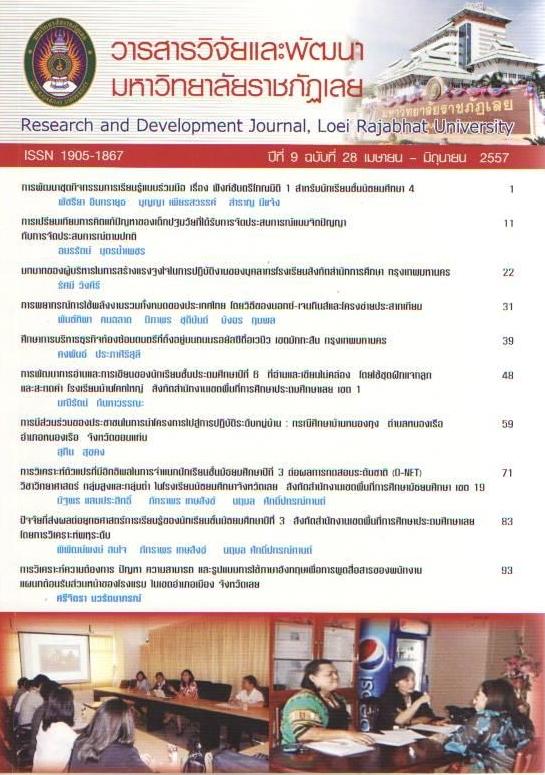การเปรียบเทียบการคิดแก้ปัญหาของเด็กปฐมวัยที่ได้รับการจัดประสบการณ์ แบบจิตปัญญากับการจัดประสบการณ์ตามปกติ
Keywords:
การคิดแก้ปัญหา, การจัดประสบการณ์แบบจิตปัญญาของเด็กปฐมวัย, psycho-intellectual experiences, problem solving thinking skills of early childhoodAbstract
บทคัดย่อ
การวิจัยในครั้งนี้เป็นการวิจัยเชิงทดลอง มีวัตถุประสงค์เพื่อ 1) เปรียบเทียบการคิดแก้ปัญหาของเด็กปฐมวัยก่อน และหลังได้รับการจัดประสบการณ์แบบจิตปัญญา 2) เปรียบเทียบการคิดแก้ปัญหาของเด็กปฐมวัยก่อนและหลังได้รับการจัดประสบการณ์ตามปกติ และ 3) เปรียบเทียบการคิดแก้ปัญหาของเด็กปฐมวัยที่ได้รับการจัดประสบการณ์แบบจิตปัญญากับการจัดประสบการณ์ตามปกติ กลุ่มตัวอย่างที่ใช้ในการวิจัยครั้งนี้คือ นักเรียนชายหญิงอายุระหว่าง 5 - 6 ปี ที่กำลังศึกษาระดับชั้นอนุบาลปีที่ 2 โรงเรียนบ้านท่าเรือมิตรภาพที่ 30 ตำบลท่าเรือ อำเภอเมือง จังหวัดนครศรีธรรมราช สังกัดองค์การบริหารส่วนจังหวัดนครศรีธรรมราช ภาคเรียนที่ 2 ปีการศึกษา 2553 จำนวน 1 ห้องเรียน จำนวน 40 คน ได้มาโดยการสุ่มอย่างง่าย (Simple random sampling) โดยมีโรงเรียนเป็นหน่วยการสุ่มหลังจากนั้นจึงจับคู่ (Matching) นักเรียนโดยใช้คะแนนการคิดแก้ปัญหาเข้าสู่กลุ่มทดลองและกลุ่มควบคุม กลุ่มทดลองจะได้รับประสบการณ์แบบจิตปัญญา กลุ่มควบคุมจะได้รับประสบการณ์แบบปกติ เครื่องมือที่ใช้ในการวิจัยได้แก่ แผนการจัดประสบการณ์แบบจิตปัญญา แผนการจัดประสบการณ์ตามปกติ และแบบทดสอบการคิดแก้ปัญหา ใช้การทดลองเป็นแบบ Randomized Control Group Pretest-Posttest Design และวิเคราะห์ข้อมูลโดยหาค่าเฉลี่ย ค่าเบี่ยงเบนมาตรฐาน และทดสอบสมมุติฐานโดยใช้ค่าที (t-test) ผลการวิจัยพบว่า
1.การคิดแก้ปัญหาของเด็กปฐมวัยหลังได้รับการจัดประสบการณ์แบบจิตปัญญาสูงกว่าก่อนได้รับการจัดประสบการณ์อย่างมีนัยสำคัญทางสถิติที่ระดับ .05
2. การคิดแก้ปัญหาของเด็กปฐมวัยหลังได้รับการจัดประสบการณ์แบบตามปกติสูงกว่าก่อนได้รับการจัดประสบการณ์อย่างมีนัยสำคัญทางสถิติที่ระดับ .05
3. การคิดแก้ปัญหาของเด็กปฐมวัยที่ได้รับการจัดประสบการณ์แบบจิตปัญญาสูงกว่าการจัดประสบการณ์ตามปกติอย่างมีนัยสำคัญทางสถิติที่ระดับ .05
Abstract
The purposes of this experimental research were to 1) compare the problem solving skills of early childhood before and after participating in psycho-intellectual experiences, 2) compare the problem solving skills of early childhood before and after through conventional experiences, and 3) compare the problem solving skills of early childhood through contemplative experiences and conventional experiences. 40 early childhood 2 students studying in the second semester of academic year 2010 at Tharua Mittrapab 30 School, under the supervision of Nakhon Si Thammarat Provincial Administration Organization, were the research samples. They were selected by using simple random sampling method. They were divided into an experimental group and a control group by matching . The research instruments used in this study were psycho-intellectual experiences plans, conventional experiences lesson plans and a problem solving thinking skills test. Randomized control group pretest-posttest design was used to conduct the research. The statistics used for analyzing the research data were mean, standard deviation and t-test was employed for testing hypotheses. The results were as follows :
1. The problem solving skills of early childhood after participating in psycho-intellectual experiences, was higher than before the experiment at the significant level of .05
2. The problem solving skills of early childhood after participating in conventional experiences, was higher than before the experiment at the significant level of .05
3. The problem solving skills of early childhood after participating psycho-intellectual experiences, was higher than those par through the conventional experiences, at the significant level of .05
Downloads
How to Cite
Issue
Section
License
ข้อความที่ปรากฎในวารสารฉบับนี้เป็นความคิดเห็นของผู้เขียนแต่ละท่าน สถาบันวิจัยและพัฒนา มหาวิทยาลัยราชภัฏเลย และกองบรรณาธิการ ไม่จำเป็นต้องเห็นด้วยและไม่มีส่วนรับผิดชอบใดๆ
สถาบันวิจัยและพัฒนา มหาวิทยาลัยราชภัฏเลย ขอให้ผู้อ่านอ้างอิงในกรณีที่ท่านคัดลอกเนื้อหาบทความในวารสารฉบับนี้






